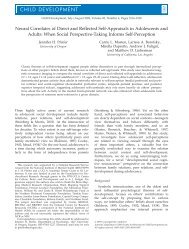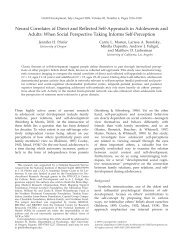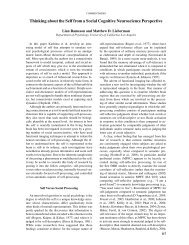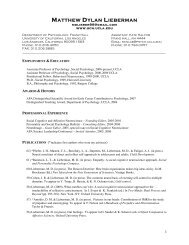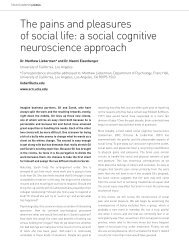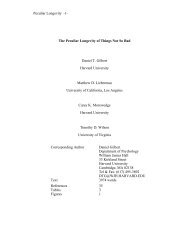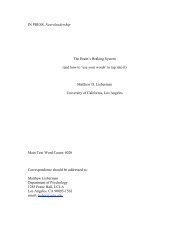In Progress – DO NOT CITE Attributional inference across cultures ...
In Progress – DO NOT CITE Attributional inference across cultures ...
In Progress – DO NOT CITE Attributional inference across cultures ...
Create successful ePaper yourself
Turn your PDF publications into a flip-book with our unique Google optimized e-Paper software.
Culture, Attribution, & Automaticity<br />
18<br />
target’s dispositions, but can only successfully perform this mental operation when they<br />
are not under cognitive load.<br />
Study 4 was designed to address each of these limitations of the previous studies.<br />
EA individuals were asked to make attributions about both US and EA targets. The<br />
valence of the target’s behavior was also reversed such that the targets appeared happy<br />
rather than anxious. Additionally, some targets behaved neutrally to provide a better<br />
baseline for assessing the magnitude of the automatic attributional bias. Participants<br />
were run through a D-sequence (discounting) paradigm during which they made<br />
attributions about the dispositional happiness of two US and two EA targets. One target<br />
from each culture appeared to be very happy in their video clip and the other target from<br />
each culture appeared neutral in their behavior. Participants were told that all of the<br />
targets were asked to tell a funny story, providing a situational explanation for the<br />
positive affective behavior seen in half of the targets. We predicted that EA participants<br />
would show greater evidence of a correspondence bias when they were under cognitive<br />
load than when they were not under load regardless of whether they were judging US or<br />
EA targets.<br />
Participants<br />
Method<br />
Sixty-three EA individuals (36 female) were recruited at the University of<br />
California, Los Angeles and Santa Monica College after responding to a flyer and were<br />
paid five dollars for their participation. EA participants had been in the United States no<br />
more than six years (mean=1.93 years) and were from Japan (37), Hong Kong (8), Korea<br />
(7), Taiwan (6), Vietnam (3), and China (2).



